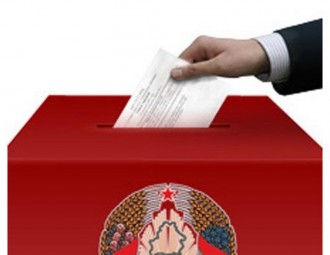The start of the 2015 presidential elections goes unnoticed by the electorate

The Central Election Commission has completed the process of accepting applications for the registration of initiative groups nominating candidates for presidency in Belarus.
Fourteen applications for registration by initiative groups nominating candidates for presidency have been submitted to the CEC. Of them, three initiative groups have already been granted official registration in the Central Election Commission: the one which supports the nomination of the incumbent President Alexander Lukashenka as well as initiative groups of Sergei Haidukevich, the leader of the Liberal Democratic Party, and Sergei Kaliakin, the leader of ‘The Just World’ party. The CEC plans to look into the applications of the remaining candidates for presidency on Monday, July 20. The number of candidates for the presidency in 2015 is slightly lower than it was during elections in 2010 when 19 applications for the registration of initiative groups were submitted. However, the majority of the teams of potential candidates numbers less than one thousand activists.
Apart from the head of state, few alternative candidates – economist Victor Tereshchenko (2010) and the chairman of the Liberal Democratic Party Sergei Haidukevich have experience of participation in presidential elections as candidates. The latter is considered by the opposition to be a sparring partner for the incumbent head of state. In addition, in 2010, such opposition organisations as the United Civic Party and ‘Tell the Truth!’ campaign, which have nominated their candidates this time, too, managed to collect 100 thousand signatures, according to the data provided by the CEC. Moreover, in the past two years the ‘Tell the Truth!’ campaign has had permanent canvassing experience under a joint initiative involving four opposition organisations called ‘the People’s Referendum’. However, the leader of the ‘Just World’ party Sergei Kaliakin failed to collect the required number of voters’ signatures in 2001 despite having a larger initiative group.
It is noteworthy that a large number of opposition activists will be distracted due to their participation in the partisan observation ‘The 2015 Right to Choose’. Eight opposition organisations, whose activists are also simultaneously involved in nominating alternative candidates for presidency, are united as a part of this observation initiative.
In all likelihood, the insufficient number of activists in initiative groups of the majority of nominees will not suffice to meet the technical requirements of Belarusian legislation which states that 100 thousand signatures are required in order for an individual to register as a candidate.
In turn, some of the opposition organisations have made allegations regarding an additional mechanism used to identify invalid signatures in order to limit the number of participants of the presidential campaign. Thus, the ‘For Freedom’ movement hopes to establish a public commission to carry out an independent examination of signatures. However, such an initiative can cause additional tension and lead to mistrust amongst opposition organisations, whose resources are limited when it comes to conducting a fully-fledged campaign to collect signatures.
It is worth noting that none of the nominees among alternative candidates for presidency are attractive for nomenclature, as they have no managerial experience in high positions in government or connections within the state apparatus.
Human rights defenders underline the growing constraints for initiative groups in terms of collecting signatures in the capital, yet some improvement regarding the situation has been noted in the regions. Thus, in comparison to the 2010 presidential campaign, the authorities have expanded the list of public places, mainly squares, where picketing is prohibited in Minsk. The Belarusian leadership is most likely to limit the visual presence of opposition in the capital in order to diminish the politicisation of society throughout the presidential campaign.
In turn, compared to the capital, traditionally, the presence of opposition has been less noticeable during political campaigns in regions, which may have a negative impact on the turnout. Most likely, the authorities will be more loyal to those campaigning for alternative candidates outside Minsk. State media provide limited information on the commencement of the election process which goes on completely unnoticed by the overwhelming majority of the electorate. At the same time, the authorities increase the pressure on the representatives of independent media in the regions. Thus, independent journalists in the Gomel and Minsk regions were detained by law enforcement officials whilst capturing footage.
Hence, the majority of the population is currently unaware of the launch of the 2015 presidential elections. The authorities will try to prevent the transformation of popular discontent with socio-economic policies, which are in place into a political dimension, by diluting public interest in the election campaign from the very outset.
-
03.01
-
07.10
-
22.09
-
17.08
-
12.08
-
30.09








































